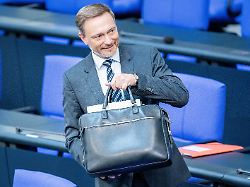The status of the budget dispute
The traffic light is struggling for billions
04/08/2023, 8:50 p.m
The SPD wants more money for defense, the Greens for needy children too. Finance Minister Lindner wants to comply with the debt brake again, but neither reduce subsidies nor increase taxes. The search for a compromise for the next federal budget is proving difficult. An overview of important factors when preparing the budget:
The financial scope
FDP boss Lindner definitely wants to comply with the debt brake – despite doubts in parts of the SPD and the Greens. According to the Basic Law, the federal government can normally borrow up to 0.35 percent of gross domestic product. All other expenses must be covered by revenue, primarily taxes.
In order to improve the cash situation, there are various proposals ranging from reducing subsidies to reintroducing the wealth tax. However, Lindner categorically rejects tax increases and does not want to remove any tax advantages.
He still has a few opportunities to juggle: For one thing, it’s unclear exactly how the money from the various special funds of the federal government will be spent. If more funds were taken from the Bundeswehr special fund, it might not be possible to increase the defense budget, or only a smaller one. There is still money in the Climate and Transformation Fund (KTF) and the Economic Stabilization Fund (WSF), which was reactivated to combat the energy crisis, will probably need less funding than initially thought.
The “petrified” editions
One problem with budgeting is that many expenses can hardly be changed. The Federal Audit Office recently criticized this as “petrification”. According to his calculations, only about ten percent of the household is currently “disposable”. The rest is “in fact withdrawn from changes in the budget preparation process” because it is a matter of legal claims, such as social benefits or personnel costs, or contractual obligations such as interest payments.
By far the largest individual item in the federal budget has long been the subsidy to the statutory pension insurance system, which recently totaled more than 100 billion euros. For comparison: According to the plan, the total expenditure of the federal government in the current year is 476 billion euros.
The wishes
The coalition partners’ expectations of Lindner’s budget are contradictory, as the dispute over the past few weeks shows. The FDP, led by the Minister of Finance, is pushing for further tax cuts and additional money for the planned share pension. Against the background of the Ukraine war, the SPD reports a higher need in the defense budget; we are talking about an additional ten billion a year.
The Greens, in turn, have declared basic child security to be a central project. Family Minister Lisa Paus assumes that there will be eleven to twelve billion euros in additional annual costs.
How it goes on
Lindner has canceled the usual adoption of key budget points in mid-March; it is now assumed that it will fail altogether. The next important date is the spring tax estimate in May, which will bring new insights into the expected state revenues. A detailed draft budget is then to be approved by the cabinet in June. After that, it’s the Bundestag’s turn. The 2024 budget will be finally approved shortly before the end of the year.
